Strange Bedfellows: Online Poker has an Unlikely New Supporter
Online poker has earned a stay of stay of execution. Late last week, the Joint Select Committee on Gambling Reform rejected proposed legislation from Senator Nick Xenophon that would have been the death knell for online poker in Australia. The legislation would have made it more difficult for money to go into or out of online gambling sites in Australia and likely caused the closure of all legitimate poker sites. Unfortunately, online Poker is included in the legal definition of ‘gambling’ with other Casino games, even though poker is about as far away from a game like roulette as chess is from snakes and ladders. There was even a provision in the new bill that would have made it illegal to offer ‘play money’ games. If nothing else represents the ludicrous depths policy makers will plumb to bash poker it is this ‘play money’ clause: in essence, banning adults from playing a skill game for no money. Sigh.
However, the Committee (made up of all the major political parties) rejected the legislation – not on the basis of it being draconian and ill-informed – but because the proposals were unworkable and unenforceable. Put simply, you can’t ban the internet. All committee members that is, with the exception of Independent and bane of the poker machine industry, Andrew Wilkie. Mr Wilkie offered a slightly different reason for his opposition – he noted that the Productivity Commission Report into Gambling (which is mainly about poker machines, but has a chapter on internet gambling) actually recommended the ‘managed liberalisation’ of online poker. While legal to play online poker in Australia, it is not legal for companies to offer Australians online casino games. The Productivity Commission rightly argued that prohibition does not work, and that a ‘low risk’ form of gambling – poker – should be legalized and trialed as a test for the broader liberalisation of online casino games. The Productivity Commission is correct in its call for a trial of online poker, and Andrew Wilkie is correct to support it.
This columnist has long held the view that Andrew Wilkie has a rational approach to the issue of gambling reform and is sophisticated enough to consider online poker on its merits. Mr Wilkie has clearly read all of the Productivity Commission report, has considered the arguments in favour of managed liberalisation of online poker, and come down with a tentative endorsement of the proposition. It does great credit to him, given his strong and principled stand for poker machine reform. It would be easy to put Mr Wilkie the in the category (and many do) of Nick Xenophon, whose reactive, almost unthinking stance against any and all forms of gambling has tarred every punter with the same brush of negativity, and depicted every form of gaming as a bad one. But Wilkie is cut from a different cloth.
Readers should note that Andrew Wilkie is the only politician to support legalisation of online poker – the only one. The Coalition – who we should remember banned online poker in the first place in 2001 with the introduction of the Internet Gambling Act (IGA) – have not come out in support of liberalisation, and indeed, have made some noises about coming down even harder on online gambling. Tony Abbott recently said he was more concerned about the ‘dark cave’ of online gambling than poker machine reform (a stupid statement, given 80% of problem gambling is related to poker machines). The Labour Party has not come out in favour of managed liberalisation, and the Greens – who often exhibit a Xenophon-like opposition to anything involved with gaming – are unlikely to support the Productivity Commission’s recommendations on online poker.
But in Wilkie it finally seems we have found someone who supports in-principle the pragmatic liberalisation of online poker. According to media reports, Mr Wilkie has acknowledged it may seem strange to some that he has come out so strongly against poker machines on the one hand, but supports managed legalization of online poker on the other. It is a distinction that is obvious to any thinking punter, but one which has long escaped policy makers in Australia and the USA. One of the things that really grinds my gears is that online poker (a game primarily of skill) is prohibited, while poker machines (an utterly mindless, repetitive, and socially damaging activity) are legal and ubiquitous.
Of online gaming, Wilkie has said the following: “Let's at least acknowledge that this gambling is occurring, that Australians are losing a lot of money on unregulated sites and at least allow Australian providers to establish sites that can be well regulated, provide a better level of protection for gamblers.” One would assume (and hope) that this includes a local subsidiary of Poker Stars for example, which would bring certainty for Australian online poker players in addition to a ‘clean’, reliable poker provider. These statements can give some small measure of hope to Australian poker players. Certainly, Mr Wilkie won’t champion this the way he has poker machine reform and his is but one lone voice in the parliament on the issue, but this is an improvement on a week ago, when not a single elected official had come out in support of liberalised online poker.
Unfortunately, the Committee will discuss in the future whether specific gaming sites may be ‘blacklisted’. Xenophon has said he will pursue this measure. If this happens, the most important question is which sites exactly will be blacklisted. I would hope common sense would prevail and the credible poker sites would have the opportunity to put forward a case on how they will comply with Australian laws, provide a good quality product to the Australian market, and abide by harm minimization guidelines for problem gamblers. In relative terms, problem gambling in poker is minute. But in the rare cases where it does exist, I am confident the major sites will offer harm minimization technology (and indeed, some of the sites already do offer such services).
However, given the record of gaming regulation in Australia, it is entirely possible that legitimate poker sites could find themselves on a ‘blocked’ list. I know for a fact that consideration was given to ‘blocking’ online poker sites about 2 years ago. Back then, Wikileaks exposed what would be blacklisted under the internet filter the Federal government had been considering (but now has been shelved indefinitely). I went on Wikileaks and looked at what sites were targeted by the filter (I believe the list is still archived on the site). The list of names that were going to be ‘blocked’ were pretty disgusting and do not bear repeating here. Suffice to say merely looking at the names of some of the site made me feel sick to the stomach. And yet mixed in with what was clearly criminal porn sites on this list were legitimate poker sites like Party Poker. Which is just outrageous. Not only was some fool painting poker as an illegal activity, they were lumping together with sick criminal porn. The level of ignorance around poker never ceases to amazes me. But back to my point, which is this: if the ‘blacklist’ that Xenophon may propose next year is approached the same way as the internet filter list, legitimate poker sites and online players could again find themselves the target of ill-considered government legislation.
So history is repeating itself for Australian poker players. We will go on playing online poker: some of us as professionals, some of us as a recreational past-time; all of us playing a stimulating game of skill. But as always, the uncertainty will remain. We will likely be able to keep playing in this legal gray area for another 12 months, and sure, maybe Andrew Wilkie will be able to talk some sense into his fellow parliamentarians. But I’m not holding my breath.

